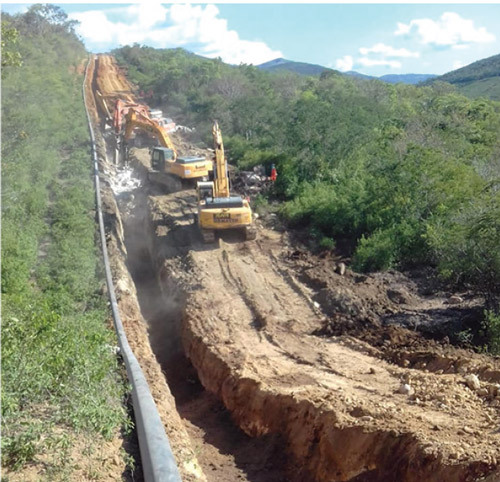President Ramos-Horta Urges Australia to Back Gas Pipeline to East Timor
(Reuters) — Indonesia, South Korea, Japan and China could all be interested in investing in a long-delayed gas project in the waters between East Timor and Australia crucial to the Asian nation's future, East Timor President Jose Ramos-Horta said on Wednesday.
Ramos-Horta named them as potential investors as his country is pushing to break a stalemate with Australia over how to develop the Greater Sunrise gas fields, looking to pipe the gas to East Timor instead of to Darwin as favored by the project's operator, Woodside Energy Group.
"So, Indonesia is a potential investor in Greater Sunrise. Why not? South Korea is one of the great potential investors," Ramos-Horta said in a speech at the National Press Club in Canberra.
Investors from Japan and China could also be interested, he said.
He urged Australia to back a pipeline to East Timor, saying it could help turn his country into the next Dubai or Singapore, bringing the country $50 billion in revenue and $50 billion in development benefits.
"We have a neighbor, Australia, that can make this miracle happen," Ramos-Horta said.
He is due to hold talks with Australian Prime Minister Anthony Albanese on Thursday.
The two fields that make up Greater Sunrise were discovered in 1974 and hold an estimated 5.1 trillion cubic feet of gas and 226 million barrels of condensate, a type of light crude oil typically found with gas.
Development was first stalled by a bitter maritime boundary dispute that was resolved in 2018. Now the main hurdle is disagreement over whether to pipe the gas to a new LNG plant in East Timor or to an existing LNG hub in Darwin.
The project is key to Timor's future as its main source of revenue, the Bayu Undan oil and gas field, will stop producing later this year, leaving the country almost wholly dependent on its petroleum fund which currently holds $18 billion.
Woodside and industry experts have long said it would cost billions more to develop Sunrise via East Timor than Darwin.
Ramos-Horta said it made no sense to him to send the gas to Darwin, which would require a 500-km (310-mile) pipeline, rather than to East Timor with a 200-km (124-mile) pipeline and added that operating costs in Timor would be much less than in Australia.
"I don't understand the economic logic of the joint venture of insisting to take that pipeline. But we are open to discussions with the government."
An independent study leaked to the Australian Financial Review last month showed that the total capital cost for the LNG project would be $11.8 billion in Darwin and $14.1 billion in East Timor.
Ramos-Horta said he was confident Sunrise would be developed, possibly in tandem with the Abadi gas field off Indonesia.
"I'm also confident that in the end we will reach agreement with Woodside and the other joint venture members," he said.
Japan's Inpex Corp., operator of the Abadi gas project, declined to comment on Ramos-Horta's remarks.
A Woodside spokesperson reiterated on Wednesday that its focus is for the joint venture, which includes state-owned petroleum company Timor Gap and Japan's Osaka Gas, to finalize a production sharing contract with the Timor and Australian governments before debating development options.
Ramos-Horta echoed comments by Timor Gap, the majority stakeholder in Sunrise, that studies show there are no economic or technical obstacles to piping gas to East Timor, despite the challenge of traversing a deep ocean trench.
Comments by Ramos-Horta that China could invest in the gas project come at a time when Australia and its allies have raised concern about Beijing's growing influence in the region after it signed a security pact with the Solomon Islands.
However, he played down any security risk from China investing in a pipeline.
When asked to assess the situation in the Solomon Islands, he said would advise the Pacific islands not to bring in regional powers that might be unwelcome to their neighbors.
"Any rational Timorese leader would never do anything without taking into consideration the sensitivities of your neighbors," he said, noting that East Timor was strategically located between Australia and Indonesia.
Related News
Related News

- Kinder Morgan Proposes 290-Mile Gas Pipeline Expansion Spanning Three States
- Three Killed, Two Injured in Accident at LNG Construction Site in Texas
- Enbridge Plans 86-Mile Pipeline Expansion, Bringing 850 Workers to Northern B.C.
- Tallgrass to Build New Permian-to-Rockies Pipeline, Targets 2028 Startup with 2.4 Bcf Capacity
- TC Energy Approves $900 Million Northwoods Pipeline Expansion for U.S. Midwest
- U.S. Pipeline Expansion to Add 99 Bcf/d, Mostly for LNG Export, Report Finds
- Enbridge Adds Turboexpanders at Pipeline Sites to Power Data Centers in Canada, Pennsylvania
- Great Basin Gas Expansion Draws Strong Shipper Demand in Northern Nevada
- Cheniere Seeks FERC Approval to Expand Sabine Pass LNG Facility
- Heath Consultants Exits Locate Business to Expand Methane Leak Detection Portfolio





Comments